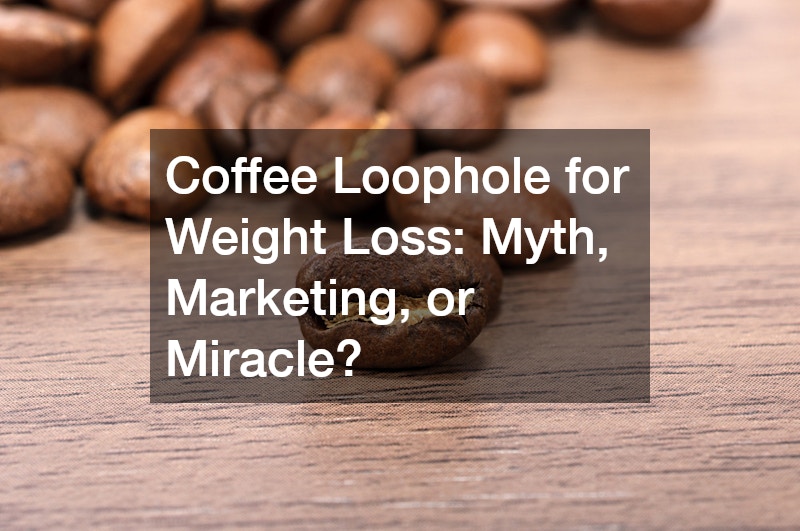For millions trying to shed extra pounds, coffee has become more than just a morning pick-me-up — it’s now the center of a trending health hack known as the coffee loophole for weight loss. Promoted in diet circles and social media, this idea suggests that your daily cup of coffee, if consumed correctly, can help accelerate fat burning, control appetite, and boost metabolism. But is this just another diet fad wrapped in clever marketing, or is there real science behind the buzz?
In this article, we’ll explore what the coffee loophole really is, how it’s being marketed, and whether it lives up to its reputation as a miracle weight loss strategy. If you’re health-conscious or trying to lose weight, understanding the facts could help you make smarter choices — and maybe even enjoy your coffee guilt-free.
What Is the Coffee Loophole, Exactly?
The term “coffee loophole” is a marketing label for using coffee strategically to assist weight loss, without drastically changing your lifestyle or following a strict diet. At its core, the concept plays on coffee’s natural benefits: it’s low-calorie (especially when taken black), it can suppress appetite, and it increases energy, potentially leading to more physical activity.
Some proponents of the loophole recommend drinking coffee:
- First thing in the morning on an empty stomach
- Without sugar, cream, or high-calorie add-ins
- In combination with intermittent fasting or low-carb diets
- Just before workouts to boost performance
This approach is often presented as a shortcut or “loophole” — a simple way to trick the body into burning more fat. While this sounds appealing, it raises questions about effectiveness and safety.
The Science Behind Coffee and Weight Loss

Before diving into whether the coffee loophole works, it’s important to understand the scientific basis for coffee’s role in weight management.
Caffeine is a well-researched stimulant that:
- Increases metabolic rate by 3–11% in the short term
- Mobilizes fat from fat tissue by increasing adrenaline
- Enhances physical performance by making exercise feel easier
Additionally, black coffee contains almost no calories, making it a great beverage choice when trying to reduce overall calorie intake.
However, the effects vary greatly between individuals based on factors like age, body composition, caffeine tolerance, and sleep habits. For some, caffeine may even lead to stress-induced eating or poor sleep, which can negatively impact weight loss.
Coffee Loophole for Weight Loss: Does it Work?
Is the coffee loophole a myth? Not entirely. There is truth to the idea that coffee — especially black coffee — can support weight loss when used wisely.
Is it a miracle? No. Coffee alone won’t lead to significant weight loss unless paired with lifestyle changes like proper diet and regular activity.
Is it marketing? Absolutely. The term “coffee loophole” is more of a catchy brand concept than a scientific term. It appeals to people looking for easy, quick-fix solutions, which often leads to inflated expectations.
Here’s what it can and can’t do:
What it can do:
- Slightly boost metabolism
- Enhance energy and exercise performance
- Help reduce calorie intake (if replacing high-calorie drinks)
What it can’t do:
- Melt fat on its own
- Replace a balanced diet or an active lifestyle
- Guarantee results for everyone
This is where it’s helpful to explore what is the coffee method for weight loss, which refers to strategic coffee consumption combined with intermittent fasting or meal timing. While the method is somewhat effective for some people, results depend heavily on overall habits and consistency.
Who Should Be Cautious with the Coffee Loophole?
While coffee is generally safe in moderation, it’s not for everyone, especially when used for weight loss.
People who should be cautious include:
- Those with heart conditions or high blood pressure
- Individuals prone to anxiety or insomnia
- Pregnant or breastfeeding women
- Anyone sensitive to caffeine
Potential side effects of overusing coffee include:
- Jitters or restlessness
- Increased heart rate
- Sleep disruption
- Digestive discomfort
- Dependence on caffeine
Always consult with a healthcare provider before making significant changes to your diet, especially if you plan to use caffeine strategically for fat loss.
Tips for Using Coffee Safely in a Weight Loss Plan

If you’re curious to try the coffee loophole or integrate coffee into your weight loss journey, keep these tips in mind:
Stick to black coffee – Avoid sugar, syrup, creamers, and milk.
Don’t overdo it – 1 to 2 cups a day is often enough.
Time your coffee smartly – Try drinking it in the morning or before a workout.
Pair with a solid plan – Combine with a nutritious diet and physical activity.
Watch your sleep – Avoid caffeine in the afternoon or evening.
Final Thoughts: Sustainable or Sensational?
The coffee loophole for weight loss is not a miracle solution, but it’s not entirely a myth either. Used thoughtfully, coffee can be a helpful tool to boost energy, reduce cravings, and slightly enhance calorie burning. However, the real key to sustainable weight loss remains unchanged: a healthy, consistent lifestyle with balanced nutrition and physical activity.
So, before buying into the hype, treat the loophole as a supplement to a plan, not a substitute for one. Your morning brew might help, but it won’t do all the work for you.



